By: debbie lynn elias
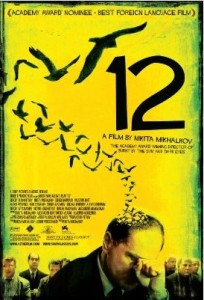
In looking through the annals of film, there is one title that consistently appears on virtually everyone’s list as being classic, iconic, masterful, mandatory viewing and a must see for any filmmaker – “Twelve Angry Men” – Sidney Lumet’s 1957 character study of 12 strangers serving as jurors to a murder trial of a young man. It is these 12 distinct personalities who will decide the fate of another total stranger. While many may believe the law is cut and dried and jury deliberations are based on testimony and legal instruction, it is, in fact, the life experience and mores of each individual juror that shape their reasoning, thought process, interpretation and analysis of a situation and ultimately, their vote in a jury room. TAM wields an emotional sledgehammer and intensity that is so well crafted that it has not only stood the test of time for some 50 years, but has spawned remakes in every medium. And now, thanks to acclaimed Academy Award winning director Nikolai Mikhalkov, we have a re-imagination of TAM for the 21st Century with 12.
Often referred to as “Russia’s Steven Spielberg”, Mikhalkov has, to my eye, surpassed the excellence of Lumet, eliciting effectively nuanced performances that are fueled with so much raw emotion and expressiveness that words are not even necessary to understand the passion of each juror and the volatility, and gravity, of the situation. A 2008 Oscar nominee for Best Foreign Language Film, 12 now makes its way to U.S. theatres this week for what I guarantee will be some of the most riveting 159 minutes of your life.
The time is 21st Century Russia. The Soviet Union is gone. A democratic process of juris prudence has taken hold where the Politburo once ruled with an iron fist. Women are sitting as judges. Western culture has infiltrated old Russia at every turn and in every manner. And a young orphaned Chechan boy sits accused of murdering a Russian soldier. The trial gives way to witness testimony of someone yelling, “I’m going to kill you”. There is testimony that the boy was seen running down the stairs away from the murdered man’s apartment. There is a woman who lives across the street who “sees everything.” And there are 12 jurors who want to get deliberations over and done with on such a “clear cut case” so they can get on with their lives. Their lives. Those very words take on new meaning when viewed in light of a young boy whose life they may be collectively taking away. And it is because of the power that each holds in his hand, that one man has the courage to look into his own heart, his own soul, his own life, and take pause and say, “I have doubt.”
It is the doubt of one juror that sets the wheels in the motion for each juror’s individual monologue as they recount events in their lives that now lead them to where they are today and how that life experience impacts their vote today.
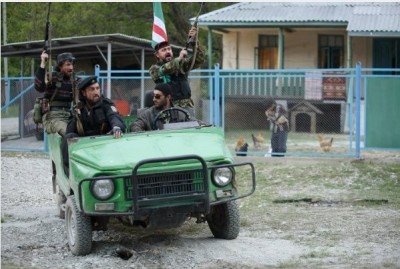
While their names may not be familiar to many of you, they should be as this collective group of actors are not only the finest in Russian cinema, but some of the finest in the world starting with Sergei Makovetsky, who gets the ball rolling with reasonable doubt as Juror Number 1. Known as the “People’s Actor of Russia”, here, Makovetsky presents a shy timid character who, only through salvation and the grace of God, is alive today and is not too embarrassed to talk about his past troubles and that because someone opened their heart to him, he is now a successful businessman, husband and father. He is the perfect Russian counter-part to the role originated by Henry Fonda in TWM. Initially insecure and filled with trepidation about confronting and challenging the other jurors, as the film progresses, his character grows more confident, more self-assured. It is a beautifully subtle but powerful transformation.
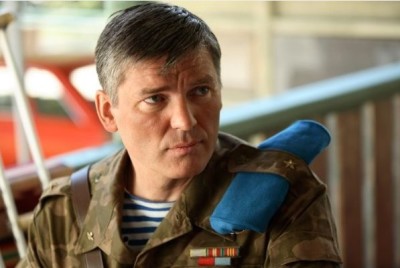
Yuriy Stoyanov as Juror 4 is another standout as the foppish and flambouyant tv producer with a Harvard education. What makes not only his character, but his performance, so notable is that it breaks the still stereotypical image of Soviet TV and the Soviet people. The Politburo may be gone, but the imagery of that era still remains. To hear Russian characters talking about reality tv and to see them dressed in perfectly tailored pin stripe suits with silk ties and hankies is very liberating and expressive for the filmmaker and for dispelling lingering ideals about Russia.
Sergey Garmash’s Juror 2 pushes the emotional envelope to the brink as the rapid cab driver. Garmash epitomizes “ass.” He makes the juror cruel to a fault and then tries to absolve himself and seek redemption in the end. He is so far superior to performances of the “angry juror” played by Lee J. Cobb in film. The vitriolic anger and rage is at times, frightening – and never moreso in a knife reenactment sequence. His performance is bone chilling.
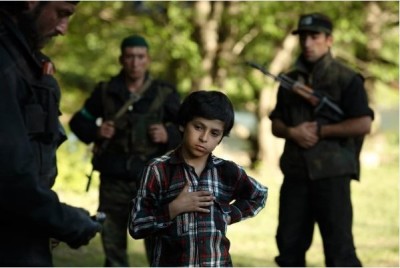
Also notable are Sergei Gazarov whose turn as Juror 5, a Chechen surgeon feeling a great kinship to the young defendant, provides cultural insight into the boy’s life as the good doctor recalls his own youth, and Valentin Graft as Juror 8 gives an emotionally vivid turn as a Holocaust survivor. Mikhail Efremov, Juror 7, provides an integral piece of the deliberations as a comedian only wanting to hit the road with his troupe and serves to balance the darker stories unfolding.
As excellent a writer and director as Mikhalkov is, his acting as the jury foreman, a former Soviet officer, is sensitive, calm and rational with a radiating empathy and sympathy; almost a godlike peace. Throughout the deliberations, he exudes a calm and serenity amidst the eye of the burgeoning storm around him. His work here is tacit beauty.
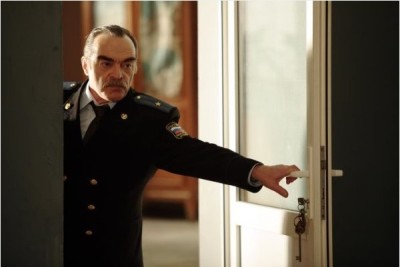
As writer and director, Nikita Mikhalkov is one of the finest. Together with co-writers, Vladimir Moiseyenko and Aleksandr Novototsky, he brings a pathos and depth to this film that fills the soul and, with each character being placed center stage, allows the audience to see parts of themselves on the screen. He embraces old and new worlds and finds a happy medium to showcase the similarities and differences of the two – much as the similarities and differences of each juror – a meld of men in different age brackets, culture and social standing, significant given the political situation between Russians and Chechans and old world Soviet Union with 21st century Russia. Touching issues of ethnic cleansing, politics, sex, feminism, war, parental respect, the generation gap, all is done with silken ease. Endearing about this script is that for all the tension, anger and passion elicited by the jurors, comic relief really comes into play with the bailiff. The guy is a buffoon and carefully utilized whenever emotions have been rubbed raw. A bit of levity gets inserted with his antics such as using the jurors cell phones of which he has custody, or napping and getting scared by his own “communication system.” Along the same vein, noticeable is the repeated use of hand raising to speak. And not just hand raising, but the old country Soviet method of a sickle slicing the air; calculating and dichotomous adding to the tension and uncertainty of the jury and which way they will swing. Very nice touch. As for the individual monologues, Mikhalkov’s own as foreman provides a great twist to the story that just tugs at one’s heart that much more. Playing into that monologue is the camera work and editing, capturing the faces of each juror as the realism of life beyond that jury room and life beyond the jail cell smack each of them in the conscience. For me, the scenes of Mikhalkov as “Uncle Nikolai” just filled my heart. They are gentility and humanity at their finest.
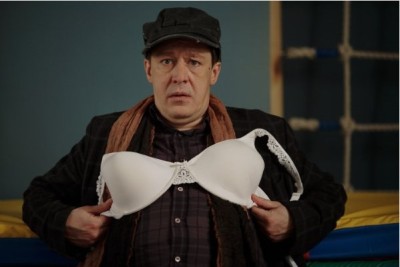
Giving the story an entirely new dynamic is Mikhalkov’s moving the jury room into a gymnasium. Providing potential multiple distractions for the jurors, the setting adds volumes to the film. In the original Lumet version, there was inclement weather affecting electricity and the same is kept here, but by Mikhalkov adding the gym with equipment and distraction. and then weaving the significance of the gym into the backstory of a juror is inspired. [No spoiler here. Sorry!] Also key to the power of this film is the use of flashbacks of the defendant’s life as a child and what led him to be an accused killer as well as inset shots of him alone in a cell awaiting his fate, all leading to indelible visual imagery.
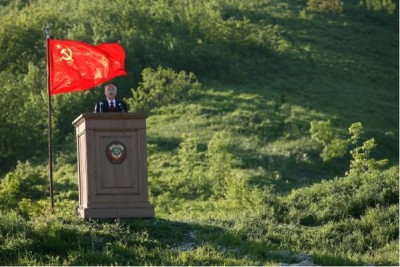
Technically, I am more than impressed with the work of cinematographer Vladislav Opelyant. His use of light and shadows is consistently symbiotic and synergistic with the dialogue, the characters and the particular backstory or case analysis being told at the time. The editing by Zaitsev and Meniconi is outstanding – particularly in showcasing the passing of time and parallel events of our young jailed Chechan with our 12 jurors. And Edward Artemiev’s score is simply beautiful.
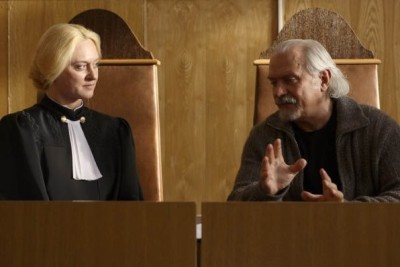
The emotional journey on which Mikhalkov takes us in 12 is fulfilled. There are no stones left unturned. No potential legal arguments or case analyses are left unbriefed. No emotion is left unscathed. You feel this film. You feel the performances. You feel the emotional power. You feel.
Directed by Nikita Mikhalkov. Written by Mikhalkov, Vladimir Moiseyenko and Aleksandr Novototsky based on the screenplay by Reginald Rose. 159 min. Russian with English sub-titles.











